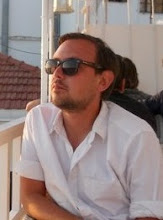An excerpt from my essay on body politics in documentary film essays in the latest Bright Lights:
The essay, on film as on paper, creates its argument from the fabric of the person writing it, such that the subjectivity of the essayistic investigation becomes an integral part of our belief in its essential truth (as opposed to Truth). Like Chronicle of a Summer, Jean Rouch and Edgar Morin's investigation of French life at the dawn of the 1960s, these films attempt to order or narrate our world's complexity, and seem all the more genuine for honestly admitting that they are just one possible organization of the same information. It is no longer possible, in our post-Cold War era of diffuse globalization and identity politics, to present the world as one of simplistic binaries and logical conclusions — thus the supposedly scientific "objectivity" of a movement like direct cinema feels forced, and the political documentary can no longer concern itself with "proving" injustice so much as asking the cozy viewer to experience it as well. Rather, fragmentary glimpses on an individual basis are the path to understanding and thus addressing complex problems...
Thus the corporeal embodiment of the filmmakers and their sicknesses in these films mirrors their figurative embodiment (representation of) broader concerns: Gore's bereavement asks us to connect the dots before our own day of reckoning; Varda's hand, horrible but continuing to glean, asks us to understand the valor of salvaging the disregarded and dispossessed; Spurlock's direct address narration at the beginning and end of Super Size Me claims his experiment to be emblematic of an entire epidemic, and makes clear that our bodies and his could share the same fate. "If this ever-growing paradigm is going to shift," he says, "it's up to you. But if you decide to keep living this way, go ahead. Over time you may find yourself getting as sick as I did." Perhaps most forcefully, Tom Joslin links the ostracism he and Mark suffer as gay men with AIDS to their sense, and possibly our own, that such treatment of putative "outsiders" is suggestive of a larger cultural death. "This civilization's so strange," he says in a mournful voiceover. "I've never felt much a part of it. I think being gay separates you a little. Certainly having AIDS and being the walking dead, if you will, separates you." To bridge that gap requires not the proof of a scientific experiment but the proof, on an individual, "brother-to-brother" basis, that Tom and Mark are human, too; their intimate lives, we see in Silverlake Life — their loves and passions, their jokes and sorrows, their sicknesses and deaths — are in essence no different from our own, even if their choices of who to sleep with and what medicines to seek may well be. To this end, Tom shoots Mark reading from a book arguing that "blatant is beautiful," that being openly gay is not only nothing to be ashamed of, but also a display of the gay body (like that of Marlon Riggs) necessary to show the public that the LGBT community poses no threat. "The personal is the political, the economic and the cultural," Mark continues. "Gay is the revolution."
8.10.2011
Subscribe to:
Post Comments (Atom)


No comments:
Post a Comment